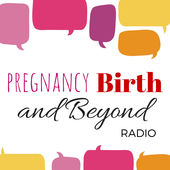
Pregnancy, Birth and Beyond: At Least You Have a Healthy Baby
Via iTunes
Why this podcast?
This podcast’s byline is –
”Bringing you the latest and ancient wisdom on maternity care and beyond and covering all things sacred women’s mysteries through news, interviews and great music.”
I think what struck me was the ”all things scared women’s mysteries”. I just love that. Oh, and, this podcast is not American! There’s nothing wrong with American podcasts of course, but there are so many of them that it’s not always easy to find one from another part of the world. Pregnancy, Birth and Beyond could not come from much further away, this podcast is brought to you from Byron Bay, Australia.
The principal hosts are:
Annalee Atia, a certified Integrative Nutrition Health & Wellness Coach, radio broadcaster, producer, trained plant-based chef, speaker and writer. You can learn more about Annalee at annaleeatia.com.
Lara Martin, a mum and the woman behind Conscious Birth. Lara describes Conscious Birth as –
”It is about learning and discovering old, new and creative ways to bring ritual, nurturance, self-love, self-acceptance and awareness to your pregnancy journey and ultimately your birth and parenting.”
And Sally Cusack, mother of two, founder of PBB radio and a member of Maternity Choices.

How does it look?
This podcast is actually a radio show that is broadcast on Bay FM every Monday morning. There are a lot of episodes already out there, well over one hundred and you are definitely not going to run out of choice. An average episode is around thirty minutes with a few very short and quite long ones lurking in there too.
Episodes cover a myriad of subjects, not only focusing on pregnancy and birth but women’s health and parenting in general. It definitely has a bit of an alternative, spiritual vibe with episodes that range from the benefits of midwife-led care, post-term pregnancy, pelvic health care, limbic imprint and ultrasounds to the chakras of pregnancy and birth, placenta smoothies, herbal wisdom, self-actualisation, cloth nappies and emotional healing with water.
Why this episode?
This episode covers the incredibly important area of postpartum anxiety and depression.
”Life with a new baby can be very lonely in today’s society”.
This is not something you often think about when you are expecting a baby but it is often all too true. So many of us live far away from our families and even those who live close by will be unlikely to have help twenty-four hours a day.
Life with a small baby can be lonely and it can be overwhelming.
In Australia, one in seven new mums and one in ten new dads will develop a postpartum mood disorder.
In the U.K. one in ten women will get postnatal depression within twelve months of giving birth.
In the U.S.A. eleven to twenty percent of new mothers will develop postpartum depression according to the Centre for Disease Control (CDC).
I honestly believe that this topic cannot be discussed too often or brought out into the open enough. So many women and their families are affected by some form of postpartum mood disorder and the more open we can be about how common it is and also how treatable it is, the better.
Lives could be improved. Lives could be saved.
Who should listen to this episode?
I think you know what I’m going to say but I’ll say it anyway.
Everyone!
Every single pregnant woman and her partner.
No one thinks it will happen to them but knowing the signs (and this is why it’s so important for your partner to listen too) could mean that you get help sooner rather than later.
Experiencing postpartum anxiety or depression does not make you a bad parent.
Asking for help does not make you weak.
You are the centre of you baby’s world and you need to be strong and healthy, not just physically but emotionally too.
The episode itself is only twenty-seven minutes long and because I want this vital information to be as accessible as possible to as many people as possible, I am going to try to keep this post short.

The episode
The host, Sally Cusack, has a very calming voice and the episode is set out in a very simple way.
The episode begins with Sally talking directly to the listeners about postpartum mood disorders and after about ten minutes this is interspersed with four interview segments.
I have to say that because the episode is less than thirty minutes it felt a bit like these had been crammed in and it might have worked better to have had a slightly longer episode or not quite as many interviews.
Having said that I still found it to be both a useful and interesting episode and the four interviews, with some really interesting experts in the field of birth, added depth and colour to an incredibly important episode.
As the podcast is Australian the term perinatal or postnatal tends to be used rather than postpartum.
I’m so happy that one of the first points made was that a postpartum mood disorder does not necessarily develop immediately after birth.
It might but it can also develop at any point within the first twelve months after birth. I think that bears repeating. And underlining.
Postpartum anxiety and depression can develop at any point during the first twelve months after birth.
It can also happen after any kind of birth.
It can happen after an extremely traumatic birth ending in an emergency C-section.
It can happen after your dream birth and it can happen after any kind of birth experience in between.
It is not limited to occurring after your first baby. You can experience a postpartum mood disorder after the birth of any child, no matter how many children you already have.
What are some of the signs?
Persistent, generalised worry.
Panic attacks.
Sleep issues.
Obsessive or compulsive behaviours.
Changes in appetite.
Extreme lethargy.
Thoughts of harming yourself or your baby.
Risk Factors
According to The Mayo Clinic, risk factors include:
Having a history of depression or postpartum depression
Having bipolar disorder
Having family members who have had depression
Experiencing stressful events in the past year, such as pregnancy complications, illness or job loss
Having a baby with health problems
Difficulty breastfeeding
Relationship problems
A weak support system
Financial problems
The pregnancy was unplanned or unwanted
Treatment for postpartum mood disorders
The episode didn’t go into formal treatment options but brought forward some tips for healing from Birth Talk such as writing out your birth story, getting validation and going through your birth notes with your care provider.
According to the Mayo Clinic, other treatment can include psychotherapy and antidepressants.
Postpartum Psychosis
This episode does not delve into Postpartum Psychosis but I felt it was important to mention it.
Postpartum Psychosis is rare and usually develops within the first week after birth.
The signs and symptoms are severe and may include:
Confusion and disorientation
Obsessive thoughts about your baby
Hallucinations and delusions
Sleep disturbances
Paranoia
Attempts to harm yourself or your baby
***Postpartum psychosis may lead to life-threatening thoughts or behaviours and requires immediate treatment***
How can you help someone experiencing a postpartum mood disorder?
There are some brilliant suggestions ranging from simply asking how they are feeling to taking over a meal or just offering to be with them.
A key point is to empathise with the parents and let them know that you are there and that you hear them but not to launch into sharing your own experiences.
Comfort in, dump out.
Sally references an article called ‘How Not to Say the Wrong Thing‘ and it sounds like a fantastic resource for those supporting someone with postpartum or actually, any kind of depression.
It utilises ring theory, where the person needing support is placed, figuratively, in the centre with rings of people surrounding them, from closest family out to friends, colleagues etc.
The person in the centre can say whatever they want about how they are feeling and you offer comfort inwards towards them.
If you need to talk about your experiences or emotions you do so with those further outside the circle than you.
Comfort in, dump out.

At least you have a healthy baby
Dismissing, lessening or invalidating the parent’s feelings is one of the worst things you can do. Whatever feelings they are experiencing are real.
Yes, a healthy baby is incredibly important but it is not the ONLY important thing.
The World Health Organization predicts that the two biggest factors that will affect the next generation over the coming two decades are obesity and depression. An excerpt from an interview with Bashi Kumar-Hazard, a human rights lawyer and board member of Human Rights in Childbirth, explores the idea that if a mother does not seek help and is not treated for a postpartum mood disorder her baby could well grow up witnessing and experiencing depression in their everyday life.
This will then go on to affect them and their life.
Getting help for postnatal anxiety or depression is vital, not solely for the woman experiencing it but for her child and the next generation. I found this to be a real eye opener as to the far reaching effects that these disorders can have.
Another interview examines why so many women seem to be experiencing these disorders.
Sheena Byrom, OBE, a U.K. midwife and board member of The Royal College of Midwives explores the idea that many women feel disappointed in their birth experience and that a key factor in this is not feeling safe with your care provider.
There are also interviews with Soo Downe, a Professor of Midwifery in the U.K. and Eugene Declercq, a Professor of Community Health Services in the U.S.A. These interviews, as well as the two already mentioned, really add depth to this episode.
To wrap up
Earlier I said that as the centre of your baby’s world you need to be strong, physically and emotionally. I would like to underline here that you deserve to be strong and happy full stop. Not just for your baby or your family but for you.
It can be common to experience a short period of ‘baby blues’ but please trust your instincts. If you think that what you are feeling is something else then reach out to someone straight away.
You don’t need to feel this way and no one will judge you as a person or as a parent if you ask for help.
I strongly urge anyone expecting a baby to listen to this episode so that you are aware of the signs.
If anyone has experienced a postpartum mood disorder and would like to share that experience I’d love to hear from you.
Resources
www.postpartumprogress.com
www.pandasfoundation.org.uk
www.mothersformothers.co.uk
Postpartum Support International
PPD Moms
Other episodes on this topic
The Pregnancy Podcast: Episode 14 – Postpartum Depression
The Birth Hour – Hospital Birth & Postpartum Depression Resources
Birthful: Episode 16 – Postpartum Depression with Kathleen Kendall-Tackett
The Postpartum Podcast – over sixty episodes covering all aspects of the postpartum period
Emily Wills is a doula based in Stockholm. She believes that birth can be a beautiful and empowering experience and started this blog as a way of sharing some really great podcasts. She is also a mother of three and an enthusiastic runner.
